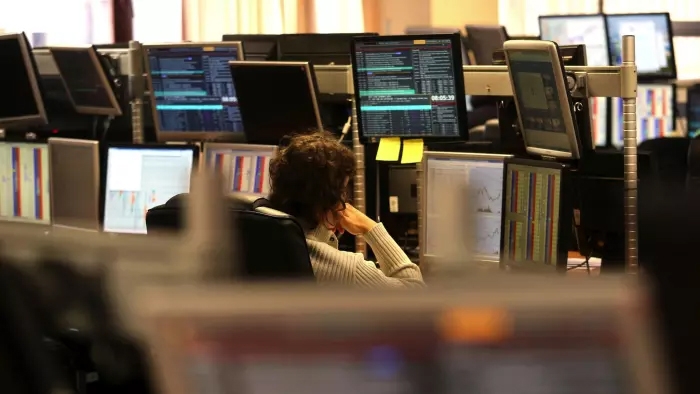
The whipsawing in global equity markets has continued, with US equities plunging after yesterday’s surge, with a lack of US policy response to COVID-19 coming as a disappointment. European policy makers have been out in force overnight, seeing steeper bond curves. Currency markets have been well-contained with modest movements overnight.
The WHO finally revealed what everyone has realised for some time – that the COVID-19 outbreak is a pandemic, saying cases outside China have risen 13-fold. The number of cases in Italy has surged by over 2,000 for the day to nearly 12,500, while the number of deaths jumped 31% to 827.The number of cases in the US has breached 1,000 but this still looks like a severe under-estimate through a lack of testing.
Policy makers across Europe came to life overnight. The Bank of England delivered an intra-meeting 50bps cut to its policy rate down to 0.25%, introduced a new term funding scheme for banks to provide cheap 4-year credit to support businesses and reduced the countercyclical capital buffer to give more headroom for bank lending. It was a coordinated policy response alongside the UK Budget, which delivered £30bn of fiscal stimulus and a pledge to spend £600bn on infrastructure, in addition to other measures to support businesses and the National Health Service.
Across the English Channel, according to sources, ECB President Lagarde told EU leaders in a private conference call that without coordinated policy action across Europe, a scenario like the GFC could develop. She said that the ECB was looking at all their policy tools, particularly measures to provide super-cheap funding and ensure liquidity and credit don’t dry up. The ECB meets tonight and the market will be disappointed if the central bank doesn’t deliver a suite of policy measures. The market consensus is still wavering on whether the ECB will bother to cut its deposit rate, which already sits at minus 0.5%. But an increase in the monthly rate of QE and another targeted LTRO aimed at easing lending conditions for SMEs seem like the least the ECB can do.
German Chancellor Merkel, who has a background in science, noted epidemiologists’ predictions that COVID-19 will infect 60-70% of the population. She suggested that closing borders was not an adequate response and Germany was moving to ban public gatherings of more than 1,000 people and advising citizens to reduce movements wherever possible. In reference to fiscal measures to support the economy she said that “we will do whatever is necessary”.
The PBoC looks set to reduce the reserve requirement ratio for banks participating in a programme to secure funding for small and medium sized companies, with the recommendation put forward by the State Council, alongside other policy easing measures.
The US government’s policy response has been disappointing, with no big stimulus package announcement that was earlier promised by President Trump and a pushback from Congress on tax relief measures. This dithering has impacted market sentiment, with yesterday’s surge in the S&P500 of 4.9%, driven on hope of policy announcements, has given way to a chunky 4+% fall so far overnight. Asian and European bourses have also been weaker, with weak S&P futures providing the weaker steer.
Despite the risk-off move in equity markets, bonds have not been particularly well-bid. The fiscal measures in the UK and rest of Europe and expectations thereof have pushed longer-term yields 5bps higher in the UK and Germany, with less increase in short rates, resulting in steeper curves. This move saw the US 10-year rate back above 0.80% not long ago (reaching as high as 0.85%), but as we go to press, rates seem to be heading south again, down to 0.75%.
The ISM released a special survey on COVID-19 impacts, revealing that nearly 75% of US manufacturing and services companies are seeing widespread supply disruptions. Firms expecting supply chain impacts anticipate that they would become more severe after the first quarter. Manufacturers with operations in China reported to be operating at 50% capacity. US CPI inflation was heading higher before the virus took hold, with the annual core CPI up 2.4% y/y, matching the fastest pace since the GFC.
There has been a bit less action in currency markets. The NZD and AUD have been well supported. The NZD pushed up through 0.63, met some resistance at 0.6340 and has settled around 0.63 in the last couple of hours. The AUD has been tracking just above 0.65. NZD/AUD revisited the top of its trading range for the year just above 0.97, where it met resistance and now sits at 0.9665.
GBP has been swinging around, diving 100pips after the surprise rate cut before regaining all the lost ground in short order and then revisiting its low near 1.2850. NZD/GBP is back up through 0.49. NZD/EUR has risen overnight to 0.5585, with the EUR falling in sympathy with the weaker GBP overnight. NZD/JPY is trading just under 66 not much changed from the NZ close, not sustaining a burst up through 66.6 overnight.
Local rates had an upward bias yesterday as they tracked US Treasury futures. Swap-bond spreads narrowed, with the 10-year government rate up 6bps to 0.98% and 10-year swap up just 1bp to 1.04%. Talk of significant NZ fiscal easing and a relaxation of the target for government debt to GDP ratio isn’t helping sentiment for the local bond market.

We welcome your comments below. If you are not already registered, please register to comment
Remember we welcome robust, respectful and insightful debate. We don't welcome abusive or defamatory comments and will de-register those repeatedly making such comments. Our current comment policy is here.